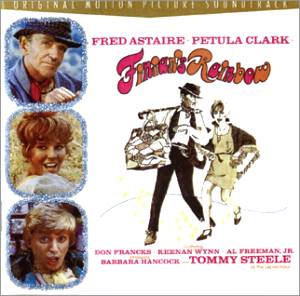Finian's Rainbow
Music composed by Burton Lane
Lyrics by E. Y. Harburg
Available on Warner Bros. Records RHM2 7852
Running Time: 53.02
Crotchet Amazon UK Amazon US

Cast:
- Finian McLonergan Fred Astaire
- Sharon McLonergan Petula Clark
- Og the Leprechaun Tommy Steele
- Woody Mahoney Don Francks
- Senator Billboard Rawkins Keenan Wynn
- Susan the Silent Barbara Hancock
I have to start this review with a confession: about 12 years ago, on a lazy Sunday afternoon, I saw the film Finian's Rainbow on television and frankly it left no real impression on me. I vaguely recall that it concerned Finian stealing a pot of gold from a leprechaun and bringing it with him to America. There was something about the leprechaun becoming mortal if he did not get his gold back. There was also something about a racist senator being turned black to get a taste of his own medicine. The music made no impact at all, so I approached this CD with a great deal of curiosity, not to mention caution.
I am pleased to say that actually, even taken out of context, the soundtrack of Finian's Rainbow is rather charming.
One thing that immediately struck me about this particular film adaptation is that almost all of the songs from the original stage production are retained.
The soundtrack proper starts with the main title version of 'Look to the Rainbow', which, like a certain other well-known rainbow-related song, talks of the importance of following your dreams (curiously enough, it is written by the same lyricist as 'Over the Rainbow' which may explain why in both cases one is instructed to 'follow the fellow who follows a dream'!). The song is quite evocative, nicely orchestrated and prettily sung by Petula Clark, although it marks the first appearance of the over-the-top 'oirish' accents that troubles the production.
'This Time of the Year' showcases the strong vocal talents of the chorus, as the Mortgage Man is defied by the locals. This is followed by the song most closely associated with the film, 'How Are Things in Glocca Morra?' as Finian reassures his daughter that things will be alright in their new home. Again a charming, if slightly insubstantial song, nicely sung.
A surprise for me was 'Old Devil Moon', a song I recognised as a 'standard' without any idea that it came from this show. This rendition is a Burt Bacharach-ish late 1960s interpretation which works well enough, although I have to admit that 'crooned' songs like this are not my particular favourite. At some point I would be interested in hearing the original stage version, stripped of this slightly over-bearing orchestration.
'Something Sort of Grandish' is a fun bit of fluff, sung with a light touch by Tommy Steele & Petula Clark, but it is difficult to work out what the context of the song is.
'If This Isn't Love' is another pretty song that is vaguely familiar without being associated in my mind with Finian's Rainbow. 'That Great Come-and-get-it Day' is a song which, while unremarkable in itself, showcases the chorus in a gospel-style anticipation of plenty in the future.
'When the Idle Poor Become the Idle Rich' has probably the cleverest lyrics in the production, in which Fred Astaire & Petula Clark point out the fact that behaviour that is just regarded as a bit of fun in the rich is a crime for the poor (losing money at the races, for example). 'The Begat' is a patter song that frankly is fairly forgettable even while listening to it, and again may make more sense given the correct context.
'When I'm Not Near the Girl I Love' is another cleverly-written comic song performed by Tommy Steele about his own inconstancy ('When I'm not near the girl I love, I love the girl I'm near').
Finally, of the songs, is an outtake called 'Necessity', sung by Brenda Amau, about that well-known mother of invention which, like most of the songs in the film, is well performed. Unfortunately it really is not terribly memorable so its omission from the sound track is understandable. Also added to this particular recording are the Overture, Entr'acte & Exit Music, and are pleasant enough as these things go.
So how do I feel about Finian's Rainbow now I am more familiar with the soundtrack? Certainly the music is more likeable than I expected from my poor memories of the movie. It is all well-performed and (with a couple of exceptions) nicely orchestrated and I will certainly be digging out this recording to listen to on future occasions. It would be interesting to compare it with the original stage version at some point. The production of the film version feels so much a product of the late 1960s that I find it hard to image the 1947 original.
Incidentally, this particular recording concludes, in a slightly bizarre manner – with a number of 10 second radio adverts by Petula Clark which frankly lose their novelty value rather quickly.
Chris Hill
3
Return to Index